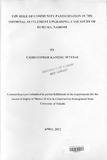| dc.description.abstract | Slum-upgrading projects are by no means easy to organise, resource, implement or replicate. To be successful, slum-upgrading projects require careful design and management. In particular, local conditions need to be considered; housing affordability and project finance must be sustainable in the long-term. One of the 'accepted' best practices in addressing the challenge of the slums is now 'participatory slum improvement'. However, despite such high-level recognition, the practice is still fairly uncommon and mostly limited to small-scale or 'demonstration' projects. The problem with community participation is that it is relatively slow to implement and depends on the cooperation, goodwill and resources of residents, as well as their governments and other stakeholders.
The purpose of this study was to find out the role of community participation in informal settlement construction upgrading and offer the way of community participation to complete the project on time. The objectives of this research are to find out the main causes of delays, the roles and way of community participation and other partners in housing projects implementation in informal settlements. The concept of informal settlement is a broad one. It can potentially include rural communities, backyard shacks and the illegal occupants of inner city buildings. The main focus of this thesis is on 'conventional' informal settlements which are typically located in the city. The area under study uses non conventional informal settlement upgrading.
The literature reviewed mainly deals with the community participation in the informal settlements upgrading and elements of community participation in upgrading. Models of informal settlement upgrading and the causes of delays in upgrading were also reviewed. The community participation adopted for this study is self reliance. This research is a case study. The sampling is both probability and non probability. The research sample was one hundred (100) units. The area of the study was the Huruma informal settlements. The tabulation of the data was used to. come up with percentages usually to compare and contrast data from different informal settlements in Huruma.
There are three types of houses in the area and they include upgraded houses, shanties and the ones under construction. In all the settlements the city council of Nairobi has already given partial approval for the plans of the housing project. The members to the group are composed of structure owners and tenants who have formed a self help group. The formation of the self help groups in these settlements helped in bringing the interest of the community together.
There is community participation in the informal settlements. The NGOs contributed by supporting the community through providing technical support in the design and construction time. The members are trained to improve their skills in construction works in masonry, carpentry and site management.
The main causes of delays in informal settlement upgrading are the funding and the cost of the housing project. It is important to clarify what the community can do and what they cannot do. All the activities that require technical knowledge that the community don't have should be given to professionals. There is a need of a master programme for the whole project so that time can be managed well. The funds should put aside to cater for variation and creating income generating opportunities in the community should be considered. To enable the houses to be affordable the Local Government should provide the infrastructure. The money that the NGOs use in providing these services can then be used in subsidizing the cost of the buildings. | en_US |

